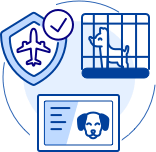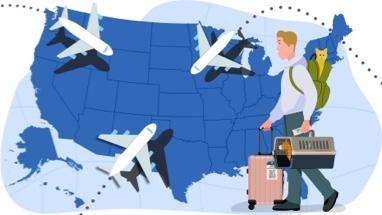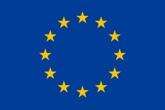Pet Travel From the United States to Poland
Travel Requirements Based on Pet Type
Carefully read ALL of the requirements related to your pet on this page.
- This page provides the most recent entry requirements and can change without notice.
- It is the responsibility of the veterinarian to make sure the pet has met all health requirements of the destination country before issuing a health certificate.
- Failure to meet the requirements may result in problems gaining certificate endorsement or difficulties upon arrival in the destination country.
- Health certificates must be legible, accurate, and complete.
Member States of the European Union (EU)
Austria, Belgium, Bulgaria, Croatia, Cyprus, Czech Republic, Denmark, Estonia, Finland, France, Germany, Greece, Hungary, Republic of Ireland, Italy, Latvia, Lithuania, Luxembourg, Malta, Netherlands, Poland, Portugal, Romania, Slovakia, Slovenia, Spain, Sweden.
Northern Ireland is part of the United Kingdom (UK), but will continue to follow European Union (EU) requirements even though the UK is no longer part of the EU. Norway and Switzerland are not part of the EU but have adopted EU legislation for import of most species of live animals.
Microchip
- Your pet must have a working microchip (also called a “transponder”) before getting its rabies vaccination for travel to the EU, and your veterinarian must always scan the microchip before giving your pet a rabies vaccination.
- If your pet does not yet have a microchip or has a microchip that doesn’t work, ask your veterinarian to implant an ISO-compliant* microchip.
- If your pet has a working microchip, but it is not ISO compliant,* you will need to travel with your own scanner that can read the microchip OR have a second microchip implanted that is ISO compliant.* Make sure both microchips are listed on the health certificate!
*ISO-compliant microchip numbers are usually 15 digits long and meet specific international standards (ISO 11784 and ISO 11785). You can check ISO-compliance with the microchip manufacturer.
Rabies Vaccination
Rabies Vaccine Requirements per EU 576/2013 Annex III
Pets arriving in EU Member States that do not meet the EU’s requirements may be refused entry or quarantined upon arrival at the owner’s expense.
- Rabies vaccines must be administered by an authorized veterinarian.
- Vaccine Manufacturer Recommended Immunity Period- All pets must wait at least 21 days, or the time designated by the rabies vaccine manufacturer prior to traveling to the port of entry. Some vaccine manufacturers recommend waiting 30 days for the pet to gain immunity. All owners or pet coordinators must ask the veterinarian to confirm the manufacturer’s recommended timeframe and add it to the rabies certification to determine the appropriate rabies vaccine validity period.
“Primary” Rabies Vaccination:
- The first rabies vaccination your pet gets after its microchip implantation or after any lapse in coverage is a “primary” rabies vaccination according to EU rules.
- For all pets vaccinated in the United States, a “primary” rabies vaccination is only valid for 1 year. Even if your pet is an adult animal and receives a 3-year vaccine, if it is a “primary” rabies vaccination according to EU rules, it is only valid for 1-year.
- Your pet must receive a booster rabies vaccination within 12 months from its primary vaccination. If your pet does not receive another rabies vaccination within 1-year of a “primary” rabies vaccination, it means the vaccination coverage lapsed and you must start over. Even if the vaccination coverage only lapses by a day, the next rabies vaccination is again considered a “primary” rabies vaccination, and it is only valid for 1-year.
“Booster” Rabies Vaccination:
- If your pet does get its next rabies vaccination within 1-year of a “primary” rabies vaccination, this “booster” rabies vaccination can be valid for 1-3 years, according to the vaccine manufacturer’s instructions.
- Your pet can travel to the EU less than 21 days or designated immunity period after a “booster” rabies vaccination, but then the previous (primary) rabies vaccination must also be included on the health certificate.
Important Health Certificate Note
For PRIMARY rabies vaccination: On the rabies vaccination table, under the header "Validity of vaccination" "from" the date entered should be at least 21 days (or applicable immunity period) after the primary vaccination was administered. Date format: dd/mm/yyyy
- Example for vaccines with a 21-day immunity period
Date of vaccination: 01/03/2019
Validity of vaccination; From: 22/03/2019 To: 01/03/2020
- Example for vaccines with a 30-day immunity period
Date of vaccination: 01/03/2019
Validity of vaccination; From 31/03/2019 To: 01/03/2020
For valid BOOSTER rabies vaccination: On the rabies vaccination table, under the header "Validity of vaccination" "from" the date entered should be the date the booster was administered. Boosters are not required to wait for the immunity period if there is not lapse between the primary vaccine and the booster.
- Example: Date of vaccination: 01/03/2019
Validity of vaccination From: 01/03/2019 To: 01/03/2022

Note: If your pet’s most recent rabies vaccination before traveling to the EU is a “booster” rabies vaccination (rather than “primary”), you are responsible for providing all relevant rabies vaccination certificates to prove there was no lapse in coverage since the "primary" rabies vaccination.
Reminder! Rabies Vaccinations do NOT count according to EU rules if:
- Your pet got the vaccination before it had a microchip; or
- Your pet got the vaccination without first having its microchip scanned.
Your pet should travel with all relevant rabies vaccination certificate(s), and it is strongly recommended the microchip number is recorded on all rabies vaccination certificate(s).
If your pet is less than 16 weeks old and cannot meet the above requirements, click here.
Want to simplify your paperwork?
Ask your veterinarian to give your pet a 1-year rabies vaccination (after scanning the microchip) at least 21 days before your travel to the EU but less than one year before your travel date (for example, 3-6 months before travel date). That way, no matter the rabies vaccination history, you only need to keep up with one vaccination certificate instead of several! Doing it this way also makes it easier for the USDA endorsement office to review, which means you get your endorsed certificate back faster.
Important
The EU has two versions of the pet health certificate: the "non-commercial" and the "commercial." Both health certificate versions require an Accredited Veterinarian to issue (complete, sign, and date) the health certificate and then USDA to endorse (countersign and emboss/stamp) the health certificate before your pet's travel. However, it is much easier to meet the timeframes for the "non-commercial" health certificate than the "commercial" health certificate, so keep this in mind when arranging your pet's travel.
"Non-commercial" Health Certificate
- You should use the "non-commercial" health certificate if you or a designated person** is traveling within 5 days before or after your pet(s), and 5 or fewer pets are traveling.
- Though uncommon, you can also use the "non-commercial" for 6 or more pets traveling to the EU for specific events like competitions, exhibitions, or sporting events.
- The "non-commercial" health certificate is valid for 30 days after the Accredited Veterinarian issues it.
- The USDA must endorse the completed health certificate within ten days of arriving in the EU. See STEP 3 below for more information on the endorsement.
Declaration: The final page of the EU Health Certificate contains a Declaration that must be completed and signed by the pet owner or designated person** before the pet travels to the EU. The Declaration must accompany the pet and health certificate to the EU.
- Note: You may use the “non-commercial” EU health certificate to travel within the EU for up to 4 months as long as your pet’s rabies vaccination does not expire. If you take your dog to Finland, Malta, Ireland (including Northern Ireland) or Norway after entering the EU, your dog must be treated for tapeworms by an EU veterinarian 1-5 days before entering those countries.
"Commercial" Health Certificate
- You must use the "commercial" health certificate if you or a designated person** cannot travel within 5 days of your pet, or you are traveling with 6 or more pets.
- The "commercial" health certificate must be issued by an Accredited Veterinarian and endorsed by the USDA within 48 hours of departing the U.S. with your pet.
**Designated person is a family member, friend, or other person authorized by the owner to travel with the pet.
Note: If a Military Veterinarian* issues the health certificate, USDA endorsement is not required. However, the Military Veterinarian must issue the “non-commercial” health certificate within 10 days of arrival in the EU, or the “commercial” health certificate within 48 hours of the pet leaving the U.S.
*Military Veterinarian is defined as a Veterinary Corps Officer, or civilian GS-0701 series government veterinarian employed by the U.S. Army Veterinary Service working at military treatment facilities. It does not apply to Army Veterinary Service non-appropriated funds or Department of Defense civilian contract veterinarians.
After your pet's Accredited Veterinarian has issued the EU health certificate, you must have the health certificate endorsed by a USDA Endorsement Office.
- "Non-Commercial" health certificate: The endorsement must happen within 10 days of your pet's arrival in the EU.
- "Commercial" health certificate: The endorsement can happen any time within the 48 hours after the Accredited Veterinarian issues the certificate.
The USDA Endorsement Office will be able to provide specific information about the process and fees associated with the endorsement of the EU health certificate. Learn more about Costs to Endorsement your Pet's Health Certificate.
If the pet has a valid EU Pet Passport, it may not need an export health certificate.
- The EU encourages all EU citizens travelling to a non-EU country with their pet animals to have the anti-rabies booster administered to their pets before departure in case the period of validity of the vaccination ends during their stay in the non-EU country.
- If EU citizens vaccinate their pets in the United States, the owner must make sure that the veterinarian follows EU rabies vaccination requirements for the anti-rabies booster to be valid to return to the EU.
- EU pets MUST have an export health certificate in addition to the EU Pet Passport to return to the EU, if they received an anti-rabies booster in the United States.
Health Certificates
Carefully read all the steps above before selecting a health certificate.
Pet Dogs, Cats and/or Ferrets (5 or Fewer Animals)
Choose the option below that best fits your pet's travel plans.
*Designated person is a family member, friend, or other person authorized by the owner to travel with the pets.
Instructions for completing the "Non-commercial" Health Certificate
Instructions for completing the Commercial Dogs, Cats, and Ferrets Certificate (2024)
Pet Dogs, Cats or Ferrets (6 or More Animals)
Six or more pets traveling to participate in a competition, exhibition or sporting event (Uncommon)
To use the certificates below, your pets must be more than six months old, and you must provide proof of entry to the competition, exhibition or sporting event.
*Designated person is a family member, friend, or other person authorized by the owner to travel with the pets.
Instructions for completing the "Non-commercial" Health Certificate
Instructions for completing the Commercial Dogs, Cats, and Ferrets Certificate (2024)
Please make sure you read all requirements for taking pet birds to the European Union (EU).
The following applies to pet birds traveling to the EU in a group of five or less.
- Identification of the pet birds
- Pet birds must have an identification number such as a clip, leg band, microchip (transponder), or tag; or
- If the pet birds will be moved to an approved quarantine establishment (Option 3 below), a description of the birds is sufficient. In this case however, the pet birds must be sealed by APHIS in their container, and the seal number recorded on the health certificate.
- The 4 options for preparation of pet birds for export to the EU are listed below. Select the applicable option to obtain a relevant health certificate.
- For all 4 options, pet birds must be examined, and an EU health certificate issued by a USDA Accredited Veterinarian within 48 hours of travel or the last working day prior to the date of departure to the EU. After your USDA Accredited Veterinarian issues the certificate, it must be endorsed by the USDA APHIS.
- Note: If the pet birds will eventually return to the United States, some requirements for the return may need to be met before export to the EU.
The pet bird was isolated from other birds under the USDA Accredited Veterinarian’s supervision for at least 30 days prior to leaving the United States.
The pet bird was isolated from other birds for at least 14 days prior to leaving the United States AND tested for Avian Influenza H5 and H7 antigens or genomes with a virus isolation or RT-PCR test. Regardless of test type used, both a cloacal swab and an oropharyngeal swab must be taken by the USDA Accredited Veterinarian at least 7 days after the 14-day isolation starts. Testing must occur at a NVSL or National Animal Health Laboratory Network (NAHLN) approved laboratory for Avian Influenza.
NOTE: the day isolation begins is considered DAY 0.
To use OPTION 3, the owner must:
- Make arrangements in advance for the pet bird to be quarantined for at least 30 days at an approved quarantine establishment upon arrival in the EU;
- Provide documentary evidence that such arrangements have been made
To use OPTION 4, the owner must:
- Request and be granted permission to deviate from the standard requirements described by the options above;
- Note: This permission comes from the government of the destination country, NOT the USDA.
- Provide documentary evidence that this permission/derogation has been granted.
For pet travel requirements not listed, APHIS has not been officially informed by the foreign country about the requirements for your pet’s travel. We recommend that you contact a government official of the country you are traveling to for more information.
Country of Destination Contact Information
Countries Participating in the European Union
Austria
Belgium
Bulgaria
Croatia
Cyprus
Czech Republic
Denmark
Estonia
Finland
France
Germany
Greece
Hungary
Republic of Ireland
Italy
Latvia
Lithuania
Luxembourg
Malta
Netherlands
Northern Ireland*
Norway**
Poland
Portugal
Romania
Slovakia
Slovenia
Spain
Sweden
Switzerland**
* Northern Ireland is part of the United Kingdom (UK), but will continue to follow European Union (EU) requirements even though the UK is no longer part of the EU.
** Norway and Switzerland are not part of the EU but have adopted EU legislation for import of most species of live animals.
Need Help?
Still Have Questions?
USDA-Accredited Veterinarians
Contact a USDA-accredited veterinarian for questions about your destination country's entry requirements for pets (including any needed vaccinations, tests, or treatments) and for issuance of health certificates.
Find a USDA-Accredited Veterinarian
USDA Endorsement Offices
Contact your nearest APHIS Veterinary Export Trade Services Endorsement Office for questions about endorsing a health certificate for pets.
Looking for Another Country?
Find your destination country requirements by using the dropdown menu below. If your country is not listed in the menu, visit Pet Travel: Unknown Requirements.




